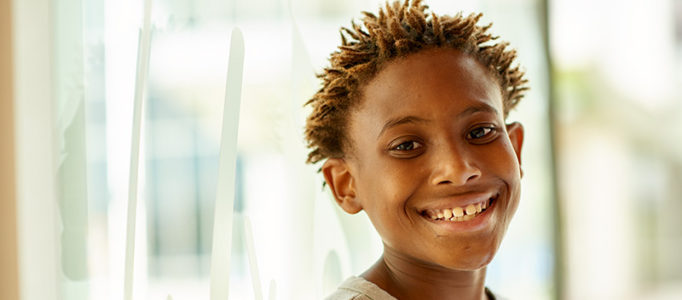There was a time when children with cystic fibrosis weren’t expected to live past elementary school. Now, for the first time, there are more adults living with cystic fibrosis than children.
Cystic fibrosis is a genetic condition that affects the lungs and digestive system. Over time, with advancements in care, kids are living longer and longer and we want them to be productive adults.
Because of this, our Cystic Fibrosis Center created a formalized transition program to help children gain health care independence. This is not an easy process, considering how complex the care plans are for children with cystic fibrosis. But that’s why we start early. We begin talking about it at diagnosis – plan for your child to be a happy, healthy adult! There will be many learnings along the way, and we will address various transition milestones as children get older.
By learning how to take care of themselves in their early teenage years, they gain the skills they need to be healthy adults.
We’ve found that there are a lot of mixed emotions around this time. Adolescents are initially overwhelmed by the idea of being in charge of their own care. But they quickly move to feeling confident that they can do it all. Similarly, parents are stressed about the idea of handing it over because they’ve been managing it for so long. But we witness a lot of joy in parents’ eyes when they see their teens become self-sufficient. They’re proud of their children, and their children are proud of themselves. These a-ha moments are some of my favorite.
If your child with cystic fibrosis is closing in on the teenage years and you’re wondering if he or she is ready for independence, take our questionnaire:
| Questions to assess if your child is ready to manage his own health care: | Yes, does well | Needs some help | No, needs help | I don’t know why this is important |
| My child understands CF and can describe to others | ||||
| I understand CF and can describe it to others | ||||
| My child knows how CF can affect his future health | ||||
| My child speaks up to tell me what she needs | ||||
| I feel comfortable elaving the room during a CF clinic visit | ||||
| My child prepares and takes her own respiratory treatments | ||||
| My child prepares and takes his own medications | ||||
| My child understand the purpose of each medication | ||||
| My child understands the importance of regular exercise | ||||
| When my child is sick, she knows how to get the right help | ||||
| My child makes his own phone calls when she is sick, needs an appointment or refills. | ||||
| I feel comfortable with my child making the above calls | ||||
| My child takes part in discussions about his health care | ||||
| I have talked to my child about the risks of alcohol, drugs, cigarettes | ||||
| My child understands how CF affects reporduction and fertility |
In our transition program, we ask teenagers similar questions to give us a starting point from which to work. Feel free to use these as a conversation starter with your child and care team. Learning how to care for themselves and knowing when to ask for help, are some of the most important, life-long skills for gaining independence.
For more information about our Cystic Fibrosis Center, or to schedule an appointment, please call 513-636-6771.





